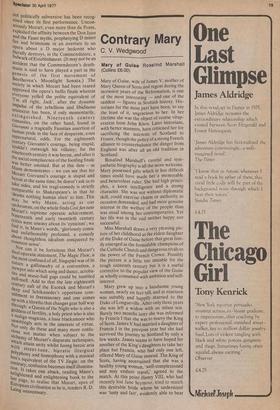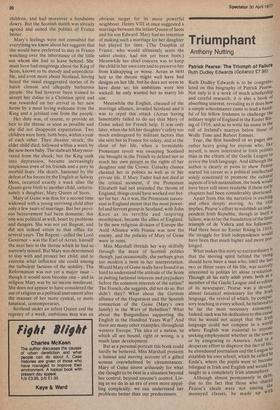Contrary 'Mary
C. V. Wedgwood
Mary of Guise Rosalind Marshall (Collins E6.00)
Mary of Guise, wife of James V, mother of Mary Queen of Scots and regent during the stormiest years of the Reformation, is one of the most interesting — and one of the saddest — figures in Scottish history. Historians for the most part have been, to say the least of it, ungracious to her. In her lifetime she was the object of coarse vituperation from John Knox. Later historians, with better manners, have criticised her for sacrificing the interests of Scotland to France, though the policy of a strong French alliance to counterbalance the danger from England was after all an old tradition in Scotland.
Rosalind Marshall's careful and sympathetic biography is all the more welcome. Mary possessed gifts which in less difficult times could have made her a memorable and benevolent ruler. She had high princtples, a keen intelligence and a strong character. She was not without diplomatic skill, could exercise charm or authority as occasion demanded, and had more genuine interest in the welfare of the people than was usual among her contemporaries. Yet her life was in the end neither happy nor successful.
Miss Marshall draws a very pleasing picture of her childhood as the eldest daughter of the Duke of Guise before that great family emerged as the formidable champions of the Catholic Church and dangerous rivals to the power of the French Crown. Possibly the picture is a little too amiable for the tough sixteenth century but it is a useful corrective to the popular view of the Guise as wholly consumed with ambition and selfinterest.
Mary grew up into a handsome young woman, nearly six feet tall, and at nineteen was suitably and happily married to the Duke of Longueville. After only three years she was left a widow with an infant son. Barely two months later she was informed by Francis I that she was to marry the King of Scots. James V had married a daughter of Francis I in the previous year but she had survived the journey to Scotland by only a few weeks. James seems to have hoped for another of the King's daughters to take her place but Francis, who had only one left, offered Mary of Guise instead. The King of Scots, having ascertained that she was a healthy young woman, 'well-complexioned and may endure travel,' agreed to the match. At this point Henry VIII, who had recently lost Jane Seymour, tried to snatch this desirable bride whom he understood was 'lusty and fair', evidently able to bear children, and had moredver a handsome dowry. But the Scottish match was already agreed and suited the politics of France better.
Mary's feelings were not consulted but everything we know about her suggests that she would have preferred to stay in France watching over the inheritance of the little son whom she had to leave behind. She must have had misgivings about the King of Scots, known to be moody and unpredictable, and even more about Scotland, having heard the usual exaggerated stories of its harsh climate and allegedly barbarous people. She had however been trained to accept her duties in a Christian spirit and was rewarded on her arrival in her new home by a most loving welcome from the King and a jubilant one from the people.• Her duty was, of course, to provide an heir to the throne as soon as possible and she did not disappoint expectation. Two children were born, both boys, within a year of each other. Then disaster struck; the elder child died, followed within a week by the new-born baby. The stalwart Mary recovered from the shock; but the King sank into depression, became increasingly suspicious even of his friends and a prey to morbid fears. His death, hastened by the defeat of his forces by the English at Solway Moss, occurred exactly a week after the Queen gave birth to another child, unfortunately a daughter, Mary Queen of Scots.
Mary of Guise was thus for a second time widowed with a young surviving child after only a few years of marriage. But her previous bereavement had been domestic; this one was political as well, beset by problems and dangers. She was not yet Regent, and did not indeed attain to that office for several years. The Regent — called the Lord Governor — was the Earl of Arran, himself the next heir to the throne which he had sonarrowly missed. But Mary was determined to stay with and protect her child, and to exercise what influence she could among the turbulent factions of the nobility. The Reformation was not yet a major issue — though it would soon become one — and in religion Mary was by no means intolerant. She does not appear to have considered the use of religion as a political instrument after the manner of her more cynical, or more fanatical, contemporaries.
Scotland under an infant Queen and the regency of a weak, ambitious man was an obvious target for its more powerful neighbour. Henry VIII at once suggested a marriage between the infant Queen of Scots and his son Edward. Mary had no intention of making such a marriage for her daughter but played for time. (The Dauphin of France, who would ultimately seem the safest choice, had not yet been born.) Meanwhile her chief concern was to keep the child in her own care and to preserve her from kidnapping or worse. Arran as next heir to the throne might well have had designs on her life, but he does not seem to have done so; his ambitions were less wicked: he only wanted her to marry his son.
Meanwhile the English, cheated of the marriage alliance, invaded Scotland and 'it was to repel this attack (Arran having lamentably failed to do so) that Mary of Guise asked for French help. It was 'only later, when she felt her daughter's safety too much endangered by militant factors that she sent her to France for safety, and at the close of her life, when a formidable Protestant revolt was sweeping Scotland she brought in the French to defend not so much her own person as the rights of her daughter and the Crown. Unlucky chance cheated her in politics as well as in her private life. If Mary Tudor had not died at the critical moment, if the Protestant Elizabeth had not ascended the throne of England, things could have worked out better for her. As it was, the Protestant succession in England meant that the most powerful and fervent group in Scotland, with John Knox as its terrible and inspiring mouthpiece, became the allies of England. In the new religious division of Europe the Auld Alliance with France was now the enemy, and the policies of Mary of Guise were in ruins.
Miss Marshall threads her way skilfully through the maze of Scottish politics though, just occasionally, she perhaps gives too modern a twist to her interpretation. Would Mary of Guise really have found it so hard to understand the attitude of the Scots in putting factional interests and prejudices before the common interests of the nation? The French, she suggests, did not do so. But didn't they? What about the German alliance of the Huguenots and the Spanish connection of the Guise (Mary's own family) in the Wars of Rebellion? What about the Burgundians supporting the English in the Hundred Years War? And there are many other examples, throughout western Europe. The idea of a nation, to which all are bound, right or wrong, is a much later development.
But as a personal portrait this book could hardly be bettered. Miss Marshall presents a human and moving account of a gifted woman overwhelmed by circumstances. Mary of Guise strove arduously for what she thought to be best in a situation beyond her control, beyond anyone's control. Living as we do in an era of even more appalling complexity, we can understand her problems better than our predecessors.



































 Previous page
Previous page